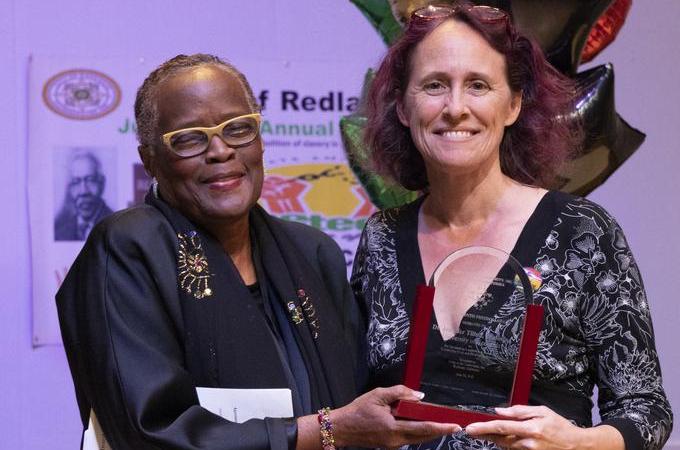The Juneteenth Freedom Awards Reception was held June 16 on campus at the University of Redlands celebrating the theme “Building Bridges to the Generations.” At the ceremony, nine awardees were honored with the Juneteenth Freedom Award.
Juneteenth Freedom Awards recipient Professor Jennifer Tilton of Race and Ethnic Studies at the U of R shared more information about her research and what the Juneteenth Freedom Award means to her with the Bulldog Blog.
Bulldog Blog: How did you become interested in studying race and ethnic studies?
Jennifer Tilton: My path to a deeper study of race in America really started at the end of college for me. I graduated in 1992 right at the time of the Rodney King beating, the acquittal of the officers, and then the uprising in Los Angeles. As a young white woman, I started to realize that there was a lot I hadn’t had to face about how the race worked in America. It was a bit like 2024 students in this generation, in terms of opening a lot of conversations about racial justice. As that was happening, I decided to apply for a post-graduate public service yearlong internship, and I was lucky enough to be hired by an amazing organization called the Westside Health Authority in Chicago, where I worked for three years in a predominantly Black neighborhood and Black led organization. Most of who I am today, what I know and the questions and work I have pursued in the decades since, comes from my experiences working in Chicago and being mentored by that community.
BB: What project or research topic are you most proud of?
JT: I love all my teaching and research, but the thing I am most excited about today is the work I'm doing in collaboration with the Bridges Project and so many amazing community history keepers, who are helping us to tell a more diverse, true, and rich history of the Inland Empire. It's been really inspiring to dig back into the early 20th-century history of San Bernardino and Redlands, and to discover the men and women who have long been building the foundation and the bridges for a truly democratic and inclusive society.
Discovering the early founders of the NAACP (the National Association for the Advancement of Colored People) in San Bernardino in 1918 or the men and women who came together to found CORE (Congress of Racial Equality) in 1963 inspires me; as does thinking with local teachers about how we can bring some of those stories to inspire young people today to see their own power to make a change. I think it's really exciting and important to understand the ground on which we stand and the history that built the communities we live in today.
BB: What does receiving the Juneteenth Freedom Award mean to you?
JT: I am incredibly honored to receive this award. I have collaborated closely with leaders in North Redlands, and from Second Baptist Church to help tell stories of the historic Black and Mexican American communities in Redlands, and that work has helped make me feel at home in this community even though it’s not where I’m from. The award really doesn’t belong to me, though, as it is a recognition of the work my students, interns, community leaders, and I have done together.
BB: What are some resources for people to learn more about Juneteenth or other facets of African American history?
JT: There are so many resources people can follow to learn more about Black history. In particular, I encourage people to follow the Bridges Project on Instagram and Facebook @IEBlackHistory. You can also find the story maps we have produced if you Google “A People's History of the I. E.”
A great recent book about California Black history is called “West of Jim Crow.” I also love podcasts and one of my favorite Black history podcasts is called “Seizing Freedom,” which does an amazing job about bringing the story of the Civil War and Reconstruction to life through Black voices and experiences. In general, I recommend paying attention to local Black newspapers like “Black Voice News” or “The Precinct Reporter,” which are both historic IE newspapers, which also continue to cover Black history and current events. I also think reading fiction can be a great way to learn more about Black history and one favorite recent novel is called “The Love Songs of W.E.B. DuBois.” There are even great picture books for young elementary students that teach Black history in wonderfully age-appropriate ways. One picture book my kids loved was "Remember” by Toni Morrison, which chronicled the school desegregation struggles in the voices and with images of kids. I want to be clear that my kids, who are white, need to learn Black history too because Black history is American history.
BB: Is there anything else you would like to share?
JT: It's been wonderful to see how actively Redlands and the University have been celebrating Black history, and Juneteenth over the last few years. So, I want to thank the committee and volunteers on and off campus who have made that possible.
To read more of the Juneteenth blog, click this link.






